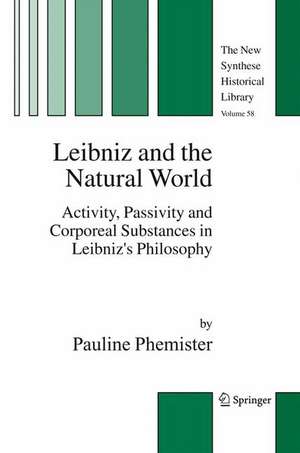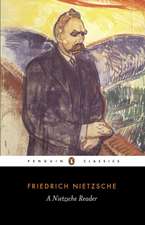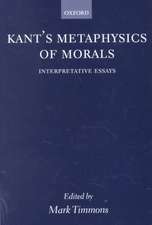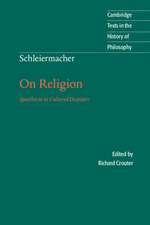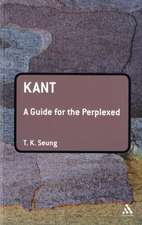Leibniz and the Natural World: Activity, Passivity and Corporeal Substances in Leibniz's Philosophy: The New Synthese Historical Library, cartea 58
Autor Pauline Phemisteren Limba Engleză Hardback – 17 iun 2005
| Toate formatele și edițiile | Preț | Express |
|---|---|---|
| Paperback (1) | 945.47 lei 6-8 săpt. | |
| SPRINGER NETHERLANDS – 28 oct 2010 | 945.47 lei 6-8 săpt. | |
| Hardback (1) | 952.26 lei 6-8 săpt. | |
| SPRINGER NETHERLANDS – 17 iun 2005 | 952.26 lei 6-8 săpt. |
Din seria The New Synthese Historical Library
- 18%
 Preț: 950.52 lei
Preț: 950.52 lei - 18%
 Preț: 949.73 lei
Preț: 949.73 lei - 18%
 Preț: 946.24 lei
Preț: 946.24 lei - 18%
 Preț: 953.82 lei
Preț: 953.82 lei - 20%
 Preț: 1618.07 lei
Preț: 1618.07 lei - 15%
 Preț: 643.00 lei
Preț: 643.00 lei - 18%
 Preț: 955.56 lei
Preț: 955.56 lei - 15%
 Preț: 644.82 lei
Preț: 644.82 lei - 18%
 Preț: 1387.55 lei
Preț: 1387.55 lei - 18%
 Preț: 955.56 lei
Preț: 955.56 lei - 18%
 Preț: 951.47 lei
Preț: 951.47 lei - 15%
 Preț: 637.46 lei
Preț: 637.46 lei - 15%
 Preț: 644.63 lei
Preț: 644.63 lei - 18%
 Preț: 952.72 lei
Preț: 952.72 lei - 15%
 Preț: 644.49 lei
Preț: 644.49 lei - 15%
 Preț: 645.47 lei
Preț: 645.47 lei - 18%
 Preț: 953.82 lei
Preț: 953.82 lei - 18%
 Preț: 958.38 lei
Preț: 958.38 lei - 15%
 Preț: 639.25 lei
Preț: 639.25 lei - 15%
 Preț: 638.89 lei
Preț: 638.89 lei - 18%
 Preț: 953.65 lei
Preț: 953.65 lei - 18%
 Preț: 950.52 lei
Preț: 950.52 lei - 18%
 Preț: 1230.66 lei
Preț: 1230.66 lei - 15%
 Preț: 646.11 lei
Preț: 646.11 lei
Preț: 952.26 lei
Preț vechi: 1161.29 lei
-18% Nou
Puncte Express: 1428
Preț estimativ în valută:
182.25€ • 189.76$ • 154.02£
182.25€ • 189.76$ • 154.02£
Carte tipărită la comandă
Livrare economică 11-25 martie
Preluare comenzi: 021 569.72.76
Specificații
ISBN-13: 9781402034008
ISBN-10: 1402034008
Pagini: 316
Ilustrații: XVI, 298 p.
Dimensiuni: 156 x 232 x 23 mm
Greutate: 0.64 kg
Ediția:2005
Editura: SPRINGER NETHERLANDS
Colecția Springer
Seria The New Synthese Historical Library
Locul publicării:Dordrecht, Netherlands
ISBN-10: 1402034008
Pagini: 316
Ilustrații: XVI, 298 p.
Dimensiuni: 156 x 232 x 23 mm
Greutate: 0.64 kg
Ediția:2005
Editura: SPRINGER NETHERLANDS
Colecția Springer
Seria The New Synthese Historical Library
Locul publicării:Dordrecht, Netherlands
Public țintă
ResearchCuprins
Substances: Public and Private.- Primary Matter.- Extension.- The Composition of Bodies.- The Composition of the Continuum.- Perceptions and Perceivers.- Phenomenal Bodies.- Derivative Forces.- Pre-Established Harmony.- Freedom.
Recenzii
"[Leibniz and the Natural World] lives up admirably to its ambitious aims. [...] in arguing for her main thesis, Phemister also provides an original and fascinating approach to two formidable challenges in Leibniz's scholarship. [...] There is much more to be found in this rich book, which any serious student of Leibniz's metaphysics should study." (Ohad Nachtomy, Bar-Ilan University, Israel, in British Journal for the History of Philosophy 16:1, 2008)
"[...] Phemister's book is a defiant attempt to free Leibniz from the fetters of this misinterpretation, and her eloquent arguments will do much to turn the tide in favour of a more balanced assessment of his natural philosophy." (Richard Arthur, McMaster University, Ontario, Canada, in The Philosophical Quarterly 57:226, 2007)
"Phemister's book is a clear and insightful study [...], and deserves the attention of everyone who wishes to appreciate Leibniz in all his depth and range." (Justin E.H. Smith, Concordia University, Canada, in The Leibniz Review Vol. 16, 2006)
"[...] Phemister's book is a defiant attempt to free Leibniz from the fetters of this misinterpretation, and her eloquent arguments will do much to turn the tide in favour of a more balanced assessment of his natural philosophy." (Richard Arthur, McMaster University, Ontario, Canada, in The Philosophical Quarterly 57:226, 2007)
"Phemister's book is a clear and insightful study [...], and deserves the attention of everyone who wishes to appreciate Leibniz in all his depth and range." (Justin E.H. Smith, Concordia University, Canada, in The Leibniz Review Vol. 16, 2006)
Textul de pe ultima copertă
In the present book, Pauline Phemister argues against traditional Anglo-American interpretations of Leibniz as an idealist who conceives ultimate reality as a plurality of mind-like immaterial beings and for whom physical bodies are ultimately unreal and our perceptions of them illusory. Re-reading the texts without the prior assumption of idealism allows the more material aspects of Leibniz's metaphysics to emerge. Leibniz is found to advance a synthesis of idealism and materialism. His ontology posits indivisible, living, animal-like corporeal substances as the real metaphysical constituents of the universe; his epistemology combines sense-experience and reason; and his ethics fuses confused perceptions and insensible appetites with distinct perceptions and rational choice. In the light of his sustained commitment to the reality of bodies, Phemister re-examines his dynamics, the doctrine of pre-established harmony and his views on freedom. The image of Leibniz as a rationalist philosopher who values activity and reason over passivity and sense-experience is replaced by the one of a philosopher who recognises that, in the created world, there can only be activity if there is also passivity; minds, souls and forms if there is also matter; good if there is evil; perfection if there is imperfection.
Caracteristici
Doctrine of corporeal substance advanced in context of Leibniz's wider philosophy Promotes non-idealist interpretation of Leibniz Takes in account the notion of passivity in Leibniz's philosophy, commonly neglected
